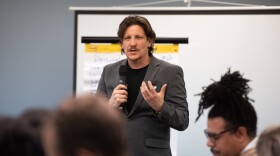A conflict between Cleveland’s city council and the mayor’s office is holding up nominations to the city commission in charge of reviewing police discipline.
As a result, the Community Police Commission hasn’t met since November because it doesn’t have enough members to make a quorum.
Cleveland City Council members have some concerns about the mayor’s nominees and want more time for vetting, said Council President Blaine Griffin at a council meeting Monday.
“This is a partnership, not a dictatorship,” Griffin said. “So, we have got to make sure we’re consulted whenever they’ve got board appointments that they want to give us.”
In November, Cleveland Mayor Justin Bibb nominated nine people to the commission and sent their names to city council for approval.
Both Griffin and Ward 1 Councilmember Joe Jones, the chair of the appointments committee, which approves all mayoral nominations, were emailed the list of nominees on November 1, according to emails provided to Ideastream by a spokesperson for the city. The council clerk’s office was alerted of the nominees in a separate email sent on November 18.
As of Jan. 8, council had not held or scheduled a confirmation hearing.
Council has had opportunities to be involved in the nomination process starting with its launch in August, including being alerted of the application opening on the city’s website and having access to videos of the finalist interviews, said Tyler Sinclair, a city spokesperson.
“It has been 67 days since we submitted the nominations and 50 days since we submitted the same list to them again, and it is only now that we are hearing concerns about nominations from council?” said Sinclair. “Why is this the first time? Why did they not raise any issues earlier when we first sent them over? Instead, they chose to wait weeks and weeks before bringing up concerns.”
There are four members of the 13-person commission currently seated. The first group was confirmed two years ago, with six members serving two-year terms and the other seven (three of which resigned last year, two years into their terms) seated for four-year terms.
The nine nominees would all serve four-year terms.
Griffin said council wants more control over who gets on the commission.
“We need to say, ‘Hey, we think we should be able to have a couple of these slots and here’s a couple of people we’d like to see,” said Griffin.
The commission wants, whoever it is, to be appointed fast, said CPC co-chair John Adams.
“By the time we operate again, it will be three or four months without a meeting,” he said, adding that new commissioners will have to be onboarded and trained, committees will have to be formed and new chairpersons selected. “I know they want to take their time, but that can’t mean the commission doesn’t meet for three or four months.”
The commission has major items to address, according to Adams, including policies on drones and officer discipline that the federal monitor overseeing the consent decree and the U.S. Department of Justice are reviewing for possible revisions. There are several command appointments that require the commission’s input, and its budget is going in front of council in the next couple of months and may be altered from the version approved by the commission.
“The CPC has nothing to do with selecting new commissioners. That’s all up to the mayor and council,” said Adams. “Can we just get at least three of these people through?”
Two current commissioners, co-chair Sharena Zayed and Shandra Benito, were nominated for a second term and could be reappointed without a hearing, said Adams. That would leave just one more appointment to get the commission to a quorum and meeting again.
“In light of everything that happened last year, council was feeling like they really wanted to vet the new people,” said Adams, referring to instances of infighting and dysfunction that marred the commission’s first two years. “But we have a lot of business we need to take care of.”





